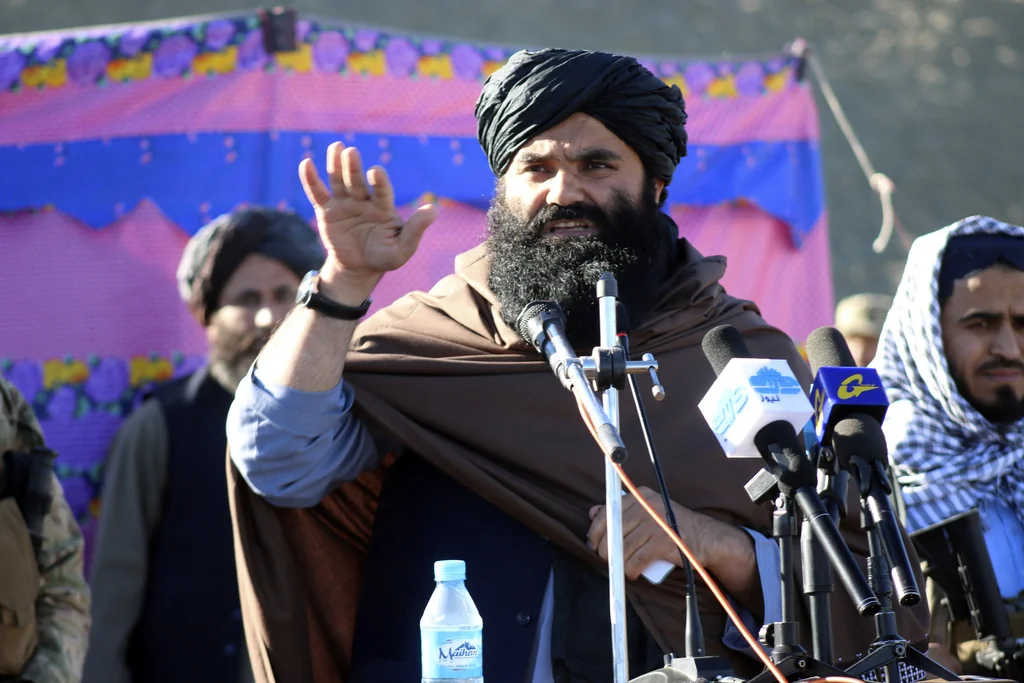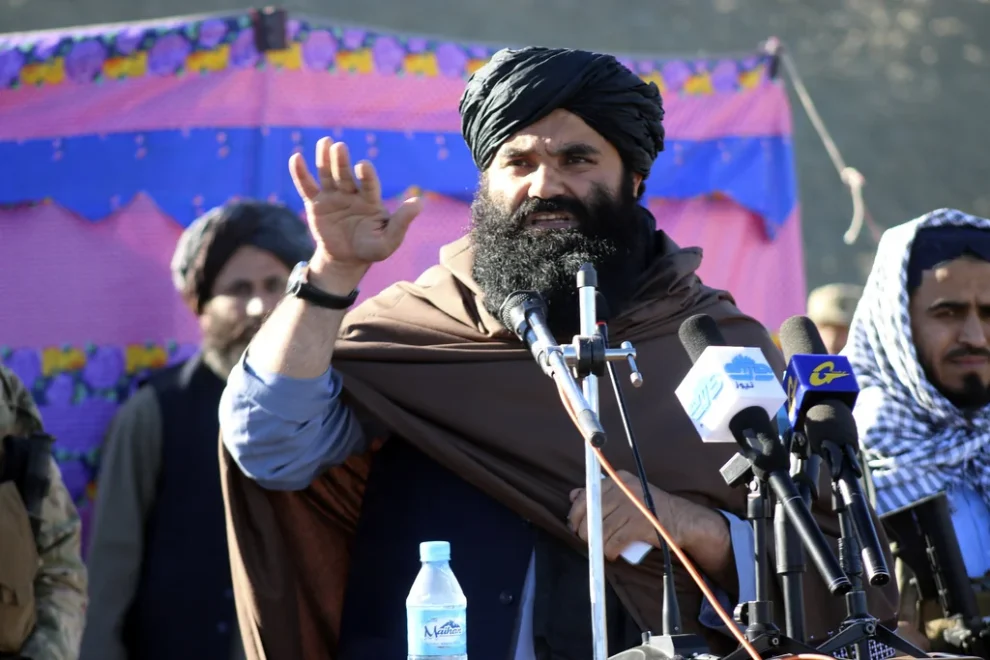The Taliban-controlled government of Afghanistan opened a “dialogue” with the United States as Congress voiced concern about the safety of Afghan refugees returning to their home country.
On Monday, Homeland Security Secretary Kristi Noem announced the revocation of temporary protected status for roughly 11,700 Afghan migrants in the U.S., putting them at risk of deportation. In a statement announcing the move, Noem argued that Afghanistan’s security and economic situations have improved to the point where TPS is no longer appropriate.
“This administration is returning TPS to its original temporary intent,” Noem said. “We’ve reviewed the conditions in Afghanistan with our interagency partners, and they do not meet the requirements for a TPS designation. Afghanistan has had an improved security situation, and its stabilizing economy no longer prevent them from returning to their home country.”

Noem also accused many recipients of the program of fraud and jeopardizing public safety or national security.
In a statement posted on X, Abdul Qahar Balkhi, a spokesman for the Afghan foreign ministry, welcomed the development.
“EA-MoFA considers recent announcement by the U.S. Department of Homeland Security as a positive step & acknowledgement of existing realities, affirming progress in Afghanistan’s security & economic environment,” he said. “IEA views this as a clear recognition of progress made in national security, economy & other areas.”
“Afghanistan is the shared home of all Afghans, & all have the right to free movement. IEA stands ready to engage in constructive dialogue with the US & other countries regarding repatriation of Afghans who no longer meet criteria to remain in host countries,” Balkhi added, stressing the importance of “bilateral mechanisms.”
The opened dialogue is some of the first diplomatic contact between Washington and Kabul since the former withdrew from Afghanistan in August 2021.
Many members of Congress, primarily Democrats, have denounced the move to end TPS for Afghan refugees.
“The Trump administration is abandoning Afghan refugees, some of whom risked their lives to support American troops, and who now face imminent, life-threatening danger in a Taliban-controlled Afghanistan,” Rep. Yassamin Ansari (D-AZ) said in a statement.
“I urge the Administration to reverse this decision,” she added.
“Afghanistan is not safe,” Rep. Jason Crow (D-CO) said, according to NBC News. “The Taliban continues to crack down on human rights and target Afghans who speak out against them, including those who aided American servicemembers like me during the war. It’s cruel and wrong that President Trump is turning his back on those fleeing violence and persecution.”
“Deporting our partners to Taliban-controlled Afghanistan is morally indefensible and recklessly endangers lives,” Sen. Jeanne Shaheen (D-NH) said.
Rep. Seth Moulton (D-MA) denounced the move as “textbook betrayal” in a statement to NPR, attempting to delegitimize the plight of Afrikaner refugees who were admitted into the U.S. on Tuesday.
“To say that the conditions in Afghanistan have improved as our allies are being hunted down is clearly absurd,” Moulton said. “I know Kristi Noem doesn’t understand the idea of risking your life for our country, but perhaps she understands outright racism in accepting Afrikaner ‘refugees’ in their place.”
The move even drew criticism from some Republicans. Rep. Michael McCaul (R-TX) said the Taliban “have made their thirst for retribution against those who helped the United States clear. Until they demonstrate clear behavioral changes, I urge the administration to continue prioritizing the safety of the Afghan men and women who risked their lives to help our troops.”
Though nearly all statements condemning the matter portrayed all Afghans under TPS as allies who worked directly with U.S. troops, the designation was broadly given to Afghans in the U.S., irrespective of whether they worked with the U.S. military. The last extension of the designation in September 2023 reasoned that the deteriorating security conditions made return unsafe, rather than that they would be targeted due to working with the U.S.
Looking to justify its decision to revoke TPS for the Afghan refugees in a Tuesday Federal Register notice, the DHS noted, “Afghanistan does not pose a threat to their personal safety due to armed conflict or extraordinary and temporary conditions.”
The department also cited a decrease in kidnappings and an increase in tourism — 7,000 tourists visited the country in 2023 alone, mostly from China.
Others have disputed the findings. The Congressional Research Service conceded that the economy has recovered somewhat since 2022 but noted that it “remains fragile and weak, leaving over 23 million Afghans — around half the population — considered to be in need of humanitarian assistance.”
A Feb. 9 World Bank report agreed that Afghanistan’s “economic outlook remains highly fragile with a very limited revenue base” but noted some improvements.
“Following two years of severe contraction, Afghanistan’s economy has shown modest growth primarily driven by private consumption. GDP growth of 2.7% in 2023/24 has recouped only about 10% of past economic losses, indicative of the slow and fragile nature of the recovery,” according to the report.
Greame Smith, an analyst with the International Crisis Group, noted in a report three years after the Taliban takeover that “some aspects of Afghans’ lives have deteriorated and others have improved.”
Rights for women and girls, political and press freedom, public services, and poverty and unemployment have grown worse. Peace and security, primary school attendance, humanitarian access to the countryside, corruption, and cracking down on drug production have all improved.
“Overall, travel is much safer: many Afghans are rediscovering their own country, reuniting with relatives in places too dangerous to visit during the war,” Smith noted, adding that the Taliban have dismantled hundreds of roadblocks and invested significantly in improving infrastructure.
Hundreds of thousands of Afghan refugees have already returned to Afghanistan since the fall of Kabul in August 2021, largely from Iran and Pakistan, the latter of which is undertaking a massive deportation operation. A comprehensive analysis of how these returnees are treated is difficult due to a lack of press freedom, as noted in a report from the European Union Agency for Asylum.
The 212-page report gave conflicting information on the situation in Afghanistan, with some measurements showing vast improvements and others showing things getting worse. It noted that violent crime has significantly decreased after a boom at the beginning of Taliban rule and that the security situation has significantly improved. Notably, an officially-sanctioned campaign of revenge hasn’t come to pass as originally feared.
The report noted that, “unlike previous power shifts in Afghan history, no ‘large-scale purges of previous adversaries,’ or massacres have taken place. Consulted sources suggest that the targeted killings that have been occurring have not been part of any ‘nationwide policy’ or an orchestrated campaign, as that would have generated significantly more deaths.”
One analyst in the report noted that the most important thing to the Taliban is citizens’ current allegiance, rather than that before their takeover. Officials have largely held to the amnesty granted to those who worked for the previous government or military, though hundreds of cases of individual Taliban members or lower-level officials enacting revenge have been recorded. Those still in Afghanistan who worked with U.S. or Western forces are believed to be at the biggest risk, with many of them living on the run or in hiding.
Several high-ranking officials who worked for the previous government, including former President Hamid Karzai, still live in Afghanistan, largely unmolested.
IS BANGLADESH THE NEXT AFGHANISTAN?
Overall, analysts largely support the DHS’s argument that the security situation has improved but hold that the country still remains dangerous and deeply impoverished, with other areas of life having gotten much worse.
The roughly 11,700 Afghan refugees under TPS represent only a fraction of the over 150,000 Afghan refugees who settled in the U.S. between August 2021 and August 2024.
























